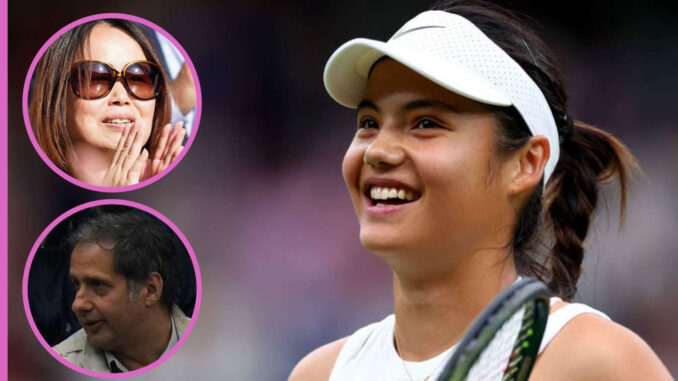
Behind every sporting legend lies a story of sacrifice, ambition, and often, a parent whose relentless drive shapes their child’s path to glory. For Emma Raducanu and David Beckham, two of Britain’s most celebrated athletes, the influence of their parents has been both a catalyst for success and a source of early tension. Raducanu, the 2021 US Open champion, and Beckham, the football icon with a trophy-laden career, owe much of their achievements to the unwavering support and high expectations of their mothers and fathers. Yet, their journeys reveal the delicate balance between parental guidance and the risk of resentment, a dynamic that has fueled their triumphs while testing their resolve.
Emma Raducanu, now 22, burst onto the global stage at 18 with her improbable US Open victory, becoming the first British woman to win a Grand Slam singles title since 1977. Born to a Romanian father, Ian, and a Chinese mother, Renee, Raducanu’s path to tennis stardom was shaped by her parents’ demanding approach. Growing up in Bromley, she was driven to and from tournaments, her game dissected with rigorous critiques. “My parents were very much against [boyfriends] as it interfered with training,” Raducanu shared, recalling how her social life, including time with friends, was curtailed to prioritize tennis. “A lot of the time I was very resentful,” she admitted, reflecting on the strict regimen that left little room for a typical childhood. Yet, she credits this discipline for her success. “I’ve seen some great people who I was playing with in the juniors who had way more lenient parents, who were like, ‘It’s OK if you lost,’ and those players don’t play tennis anymore, so I don’t blame my parents for it,” she said. Her parents’ tough love, rooted in their own challenging upbringings, instilled a resilience that Raducanu now sees as a cornerstone of her career, which has earned her over $5.5 million in prize money, including $237,000 for reaching the third round of the 2025 US Open.
David Beckham’s story mirrors Raducanu’s in its intensity. The 49-year-old former Manchester United star, who won six Premier League titles and a Champions League crown, was driven by a desire to earn his father Ted’s approval. Ted, a kitchen fitter and ardent Manchester United fan, was a constant presence, pushing Beckham to excel from his days at Ridgeway Rovers, a local youth team coached by his father. “At school whenever the teachers asked, ‘What do you want to do when you’re older?’ I’d say, ‘I want to be a footballer,’” Beckham recalled, noting that his ambition was met with skepticism. Ted’s approval was hard-won, arriving only after Beckham earned his 100th England cap. “It was the moment that we sat at dinner after I’d won my hundredth cap in Paris and he put his arm around me, and said, ‘you made it, boy,’” Beckham told James Corden, reflecting on a career that included 19 major trophies across four countries. Despite the delay in paternal validation, Beckham’s drive to please his father fueled his work ethic, transforming him from a promising talent into a global icon.
The influence of parents extends beyond discipline to emotional support. Raducanu’s mother, Renee, has been a “big pillar” in her life, offering both professional and personal guidance. “My mum is a big pillar of mine in all senses, professional and personal,” Raducanu told Women’s Health, crediting Renee’s resilience for teaching her to bounce back from setbacks. In China, visiting her grandmother, Raducanu finds solace away from the pressures of fame, indulging in simple pleasures like playing the piano and reading. Similarly, Beckham’s mother, Sandra, a hairdresser, provided a nurturing counterbalance to Ted’s exacting standards, attending matches and supporting his journey from Leytonstone to Old Trafford. Their presence in the stands, much like Renee’s at Wimbledon, symbolized unwavering commitment.
Yet, the “pushy parent” label carries risks. Raducanu admitted to resenting her parents’ restrictions, which included a boyfriend ban that isolated her socially. “It made me very confident and comfortable in my own company, which is also a big strength,” she noted, turning a perceived negative into a positive. Beckham, too, faced moments of strain, with Ted’s high expectations creating a sense of distance until that pivotal 100th cap. Both athletes navigated the fine line between pressure and motivation, a dynamic sports psychologist Adam Nicholls describes as critical. “If you look at all the greats, they’ve had massive parental influence,” Nicholls observed, noting that such involvement can be a “big reason for their success” but risks burnout or fractured relationships if mishandled.
For Raducanu and Beckham, their parents’ sacrifices—weekends spent at tournaments, financial investment, and emotional support—paid dividends. Raducanu’s 2025 US Open run, though halted by Elena Rybakina in the third round, netted her 130 WTA points, edging her closer to the top 30 from her No. 35 ranking. Beckham’s legacy, built on his parents’ belief, endures through his ownership of Inter Miami CF and Salford City. Their stories highlight the power of parental drive, tempered by love, in forging champions. As Raducanu put it, reflecting on her parents’ methods, “I don’t blame them for it.” For both, the journey from resentment to gratitude underscores the complex, transformative role of parents in their ascent to greatness.
Leave a Reply